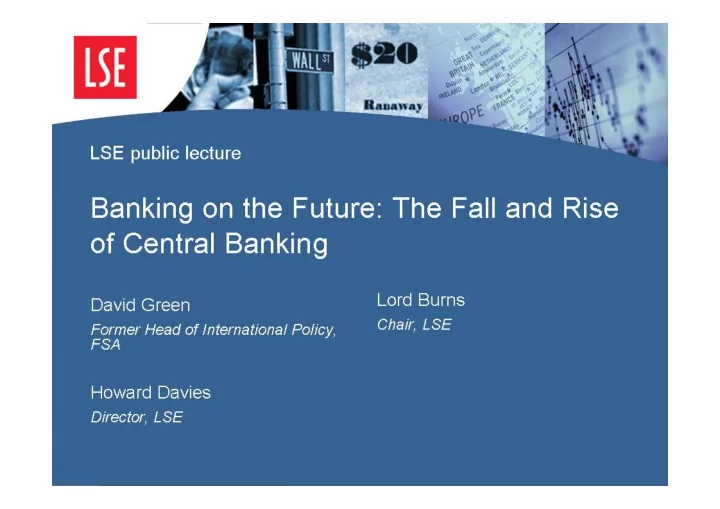

LSE public lecture Banking on the Future: The Fall and Rise of Central Banking Lord Burns David Green Chair, LSE Former Head of International Policy, FSA Howard Davies Director, LSE
Central Banking in Europe: Unfinished Business LSE 12 May 2010
Creation of monetary union is the most ambitious central banking project ever Recent events have exposed in stark form many of the key issues in central banking today • Whether inflation is more important than stability of the financial system • Whether monetary policy can be conducted independently of fiscal policy • What role a central bank should have in supervision
How did we get here? Why did something have to give? Where are we now? What does it mean?
Many minor institutional details resolved, though at the cost of major inefficiencies In a monetary union of sovereign states • Which responsibilities should be merged and which not • What should be identical across jurisdictions and what not • How much power should be at the centre and how much with national central banks
The big issues never addressed (1) Some of the key decision-makers never understood them • Political motives and superficial economic attractions paramount • Marriage without option of divorce believed to minimize risk of armed or commercial conflict • Not understood that there would be a single interest rate
The big issues never addressed (2) • Not understood that a government could run out of cash without its own central bank to print it or reduce its debt burden though the option of devaluation • Not believed that fiscal discipline was a necessary, not just a desirable requirement for euro area members
Now the fault lines have split open “EMU is unfinished business” Commissioner Almunia, October 2008
Always known that with a single interest rate and no option to change the exchange rate real competitiveness was critical For a decade • Single interest rate meant that credit could expand extravagantly at a national level • Risks masked by the global Great Moderation AND by cross-border funding of deficits And then • Mervyn King’s NICE decade – non-inflationary and consistently expansionary – came to an end • Lending halted abruptly by prospect of sovereign insolvency
There has been a remarkable divergence in competitiveness Real exchange rate* and relative export performance, cumulative change between 1999 and 2008 *Real exchange rates are based on unit labour costs. Source: Bruegel Policy Brief, March 2010.
Greece is the frontrunner as the most vulnerable country of the euro area Vulnerability index Source: CEPS Policy Brief, No. 202, February 2010.
Monetary policy tools could do little • Like all central banks ECB has nothing but its own balance sheet and the power of persuasion • Pressure for it to stop telling finance ministers what to do and instead use its balance sheet by printing money
Monetary policy easing not enough – only governments could do what was necessary • Direct inter- country loans ? • Multilateral loans ? – International Monetary Fund – European Monetary Fund • Gifts ?
Financial fragility and supervision of the European banking system • Crisis in the financial system • De Larosière reforms • Role of ECB and European Systemic Risk Board • Exposure of European banks to PIGS fresh reminder of existing challenge • ECB purchases of euro area government bonds • Provision of dollars to banks
Functioning of Eurosystem • Challenges for ECB bound to come • Lack of transparency • One vote per country – but hitherto always consensus • Ratio of centre to regional vote • Could strength become a weakness ?
So where are we now ? (1) • The common fiscal arrangements seen as needed to finish the “unfinished business” are almost in place • Monetary policy will focus on the financial system rather than inflation or exchange rate • Votes will matter in the ECB • The ECB is bound to become more closely involved with supervision
So where are we now ? (2) • The UK ? • The Eurogroup of finance ministers has been confirmed as a major decision- making body • The UK’s position in Europe has changed – and so has the Bank of England’s
Recommend
More recommend